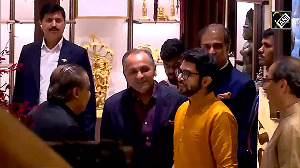'To be good at the heptathlon takes at least seven years; to compete internationally and win medals takes 10 years.'
'Swapna became Asia's best heptathlete in just five years!'
'Nobody would have believed it. but she did it.'

"Ami chaina o beshi akashe uruk. Akashe urle toh matite pa thekbena (I don't want her head in the clouds, I want her feet on the ground), Coach Subhas Sarkar says of Swapna Barman, the first Indian athlete to win the heptathlon at the Asian Games.
The 55-year-old coach has been on the phone almost continuously, fielding, and more often than not, turning down requests for Swapna's presence at inaugurations in Kolkata and its suburbs.
"Durga puja, Kali puja, ei udghatan, shei udghatan (this inauguration, that inauguration) ufff baba... I simply say no," Sarkar adds.
In 2011, he had uprooted an "unimpressive" 13 year old practising the high jump at her home in Jalpaiguri and brought her to Kolkata, 600 kilometres away. He had been told she had talent, but no opportunity to train, and would wither away and die under the crushing poverty of her circumstances.
Seven years later, 21-year-old Swapna made history at last month's Asian Games in Jakarta.
In the afterglow of her feat, Swapna has said several times that she may have achieved her dreams, but, more crucially, she has fulfilled her coach's hopes.
Coach Sarkar, the bearded, reserved, professorial man, has been the wind beneath her wings.
Back home in Kolkata on Sunday after a week in Mumbai following consultations with doctors for Swapna's injuries, Sarkar sounds subdued.
Doctors in Mumbai have told him Swapna does not need operations on the injuries to her knees and spine.
This means Sarkar cannot depend on medical intervention to heal her. "Exercises will have to be shuffled, jumps will have to be avoided. It will be very difficult. Ektu toh problem hobe. There will be a few problems. Let's see. We will prevail and win," he says.
In a conversation with Rediff.com's Swarupa Dutt, Sarkar talks about his main (not star, he insists) student, and their journey to gold.
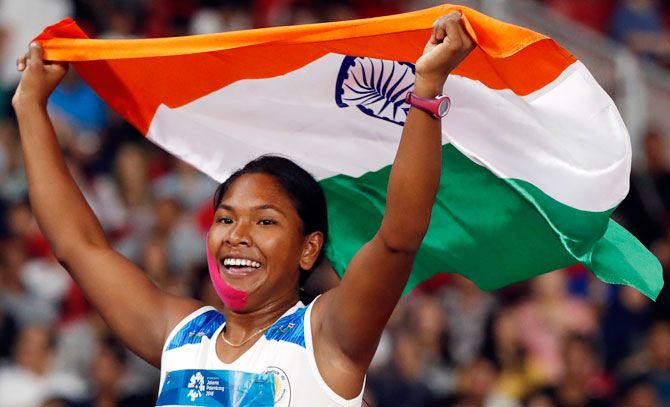
On the morning of August 30, only one person in the world knew India would win its first-ever Asian Games gold medal in the heptathlon.
Coach Subhas Sarkar had done the math.
Swapna Barman had a 63-point lead over her nearest competitor, Chinese athlete Wang Qingling but, more importantly, he knew that the girl he had been rigorously training for seven years could deliver.
Swapna came in fourth in the penultimate 800 metres of the seven-event heptathlon at 2:21, logging 6,026 points from the seven events that comprise the sport and pipping Wang to gold and forever emblazoning her name in sports history.
Before she stood beaming on the podium with the tricolour draped around her shoulders, Swapna went up to Sarkar and touched his feet -- an acknowledgement of his immense contribution in her life.
The coach patted the champion's head in a gruff, embarrassed, blessing, but stayed firmly on the sidelines.
In every interview since that golden day, Swapna has always given credit to her 'Sir'. He is her guide, her coach, her mentor, her punching bag, her advisor and the object of her rage (when he is a disciplinarian), respect and affection.
For Sarkar, Swapna is not just the embodiment of success at the end of decades of struggle, personal loss and sacrifices, but a vindication -- especially over naysayers who thought he was wasting his time over the wrong girl in the wrong sport.
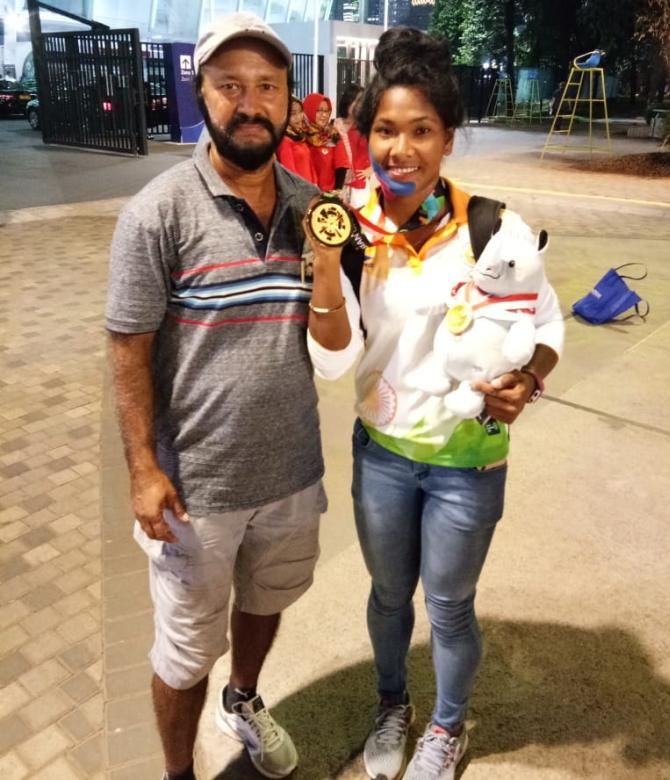
All coaches begin as sportsmen. Sarkar had chosen the track and field event -- the triple jump.
"Ami nije birat kichu player chhilamna (I wasn't a great big player), so I decided to make the switch to coaching and joined the Sports Authority of India in 1992. I have trained at least 30 national level medallists and apart from Swapna, two international level medallists, primarily in the high jump," he says.
"My student Hari Shankar Roy held the national record for the high jump and has won several medals at the Asian All Stars Athletic Championship and South Asian Games, and is also a Commonwealth Youth Games gold medallist."
"After 26 years in the profession -- I am 55 now -- seeing my students on the podium is not new. But the feeling of fulfilment when I saw Swapna win her gold is unparalleled. I myself am surprised by the depth of my feelings," he says.
Comfortable as he is while talking about Swapna, he is as reluctant to have the spotlight turned on him. He only admits, while refusing to get into the details, that he has given up a lot on the personal front, to see her win.
He would spend at least 14 to 15 hours a day with her every day in the run up to the Games. Mentoring, guiding, training, just being her sounding board... long after all the other coaches and players had turned out the lights.
Now, a month since Jakarta, another battle looms for Sarkar.
As has been well documented, Swapna won despite a tooth abscess (the pain was so excruciating at the Games that she had to tape her jaw to reduce vibrations to the tooth), 12 toes painfully cramped in regular shoes, a knee, back, and ankle injury.
She has had two dental extractions and as many fillings since, but for the more critical injuries, Sarkar had banked on surgical intervention to repair the wear and tear sustained over the years.
Swapna and Sarkar spent all of last week meeting specialists in Mumbai. "Doctors have told us that right now operations are not necessary. Jerokom aachhe sherokom choluk (Let it continue the way it is). The injuries to the knee, back and ankle have not worsened, so doctors said an operation is a last measure," says Sarkar.
"Right now, she needs strengthening exercises so that the injuries can heal and she can begin training again," he adds.
Which means Sarkar has to now rethink the way ahead for Swapna.
"Hmmm. Yes. It is a huge challenge, and the responsibility is now entirely mine. Doctors said that even if she does undergo an operation there is no guarantee she will improve. Ei bhabe chaliye jete hobe (We will have to manage like this)," Sarkar says stoically.
"See, I have some idea about these things, so I know nothing in the world will heal a MENISCUS TEAR. There is no treatment for it, it never mends, or heals, the tear will always remain. I will have to train her remembering that, we will have to work with what she has," he says.
The meniscus is a piece of cartilage that provides a cushion between the femur (thighbone) and tibia (shinbone). There are two menisci in each knee joint. They act as shock absorbers and stabilise the knee. They can be damaged or torn during activities that put pressure on or rotate the knee joint like athletics. Swapna has a grade III meniscus tear which normally requires surgery, but doctors have advised against it since success is not always guaranteed.
He says her knee hurts when she walks, and while she can compete even now, it's unwise since the injuries can worsen.
"I want to her to heal so that when she begins training, there will be no damage," Sarkar explains.
Sarkar is adept at making the most out of a bad deal.
When he first saw Swapna in 2011, training in Jalpaiguri, he was unimpressed. She had nothing going for her.
Short, a heavyset body, overly muscular thighs, and, of course, 12 toes that put brakes in her speed.
"Like her, I am also from Jalpaiguri and the coach she was training under then told me about her. 'Subhashda, take her under your wing, if she remains in Jalpaiguri, shesh hoye jabe (she will be finished). She will be put to work in the tea gardens with her mother'," he told me.
"So I got her to Kolkata against my better judgment, but believe me it's the best thing I did. She began improving phenomenally. From a 1.53 metre high jump, she did 1.78 in under two years and achieved two junior national records," Sarkar says.
Swapna was soon clearing 1.90 metres, the cut-off needed to win medals.
But Sarkar felt with the disadvantage of her stocky frame she would not be able to win consistently. So, much to everyone's surprise, in 2013, he moved her to the heptathlon.
"She has exactly the kind of body that is wrong for the heptathlon. Just 5'3", Swapna has excessively heavy thighs for a sprint and during each stride, her legs rotate inwards, but her ankles rotate outwards, which lead to injuries," the coach explains.
"What she has is strength, brute force, tenacity and the indomitable will to excel," Sarkar points out.
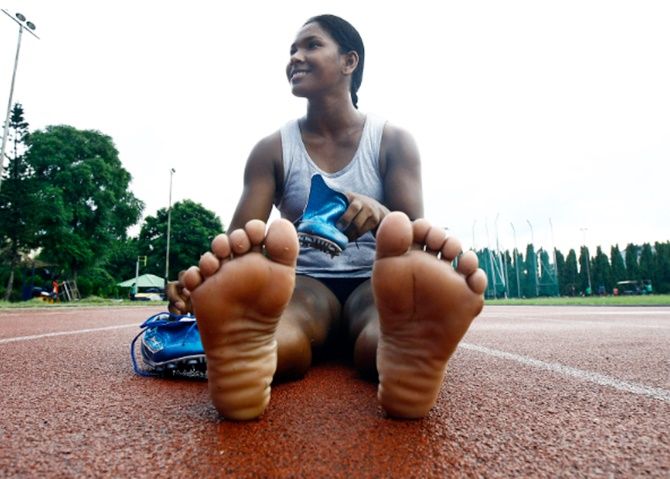
Under Sarkar, Swapna totted up medals. In 2013, she won three golds at the Asian Schools Championship and in the same year became India's junior heptathlon champion and held the national record for the high jump.
At the 2014 Asian Games, with just a year's training, she finished fifth with 5,178 points.
The same year, at the Under-20 heptathlon, she came in second.
In 2015 she won a high jump bronze at the South Asian Federation Games. But a severe back injury for two years in 2015 and 2016 put paid to more medal hopes.
The training continued, but at a minimal pace.
"Those were difficult years for her," says Sarkar, adding that Swapna was depressed.
"When your body doesn't work, your mind won't either."
Then, in 2017, she was back on the field and won the gold at the Asian Track and Field Championships.
"To be good at the heptathlon takes at least seven years; to compete internationally and win medals takes 10 years. Swapna became Asia's best heptathlete in just five years! Nobody would have believed it. but she did it," he says.
In May this year, two months ahead of the Asian Games, Swapna was scoring 6,100 points and right then, Sarkar knew she would get gold.
But in June everything changed.
Swapna faced multiple injuries -- her back, knees, ankle, even appendicitis. At the Asian Games inter-state qualifiers in Guwahati the same month she scored just 5,725 points. She could barely do the high jump or the hurdles because of her injuries and her confidence levels fell.
"Years and years of practice down the drain. We thought we wouldn't be able to make it to Jakarta," he says.
The federation sent a letter asking for an explanation for Swapna's poor performance (Sarkar had promised 6,100 points).
"I was extremely worried that she may not be able to meet the targets I had set for her. I played it by the ear and told the federation she would do better at the Games. At least, I hoped she would," he says.
In July, a month before the Games, Swapna injured her knees further and everyone said she was not in a position to participate in the Games.
"A lot of articles have been written about how ill tempered and difficult Swapna can be and how difficult it must have been for me to train her. But let me tell you, she has tremendous mental strength, shanghatik moner jor (the willpower) to ignore the excruciating pain she was in and perform."
"And she did it and that single medal changed her life," he says.
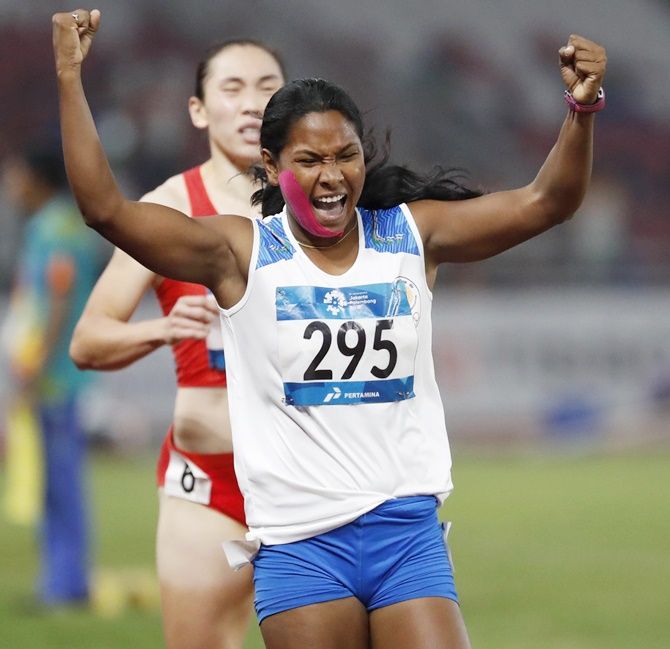
He can't 'tolerate this mobile culture' or staying up late and partying or talking on the phone late into the night, or eating street food.
Swapna, like any young girl, loves all of that. Photograph: Issei Kato/Reuters
For a start, custom made shoes from Adidas, a Rs 10 lakh (Rs 1 million) cash reward from Bengal Chief Minister Mamata Banerjee, a house in Salt Lake, Kolkata, near the Sports Authority of India premises (Sarkar thinks "Madam will keep her promise"), jobs in the state government and the Indian Railways and adulation in spades.
Sarkar says he can't underscore how important it was for Swapna to win a medal in the Asian Games, any medal, not necessarily gold.
A couple of years ago when she began to win medals she was offered a job in the Indian Railways. Her family wanted her to take it up because they were uncertain about her future. Her family is poor and a steady government job is always welcome.
"But I didn't allow her to join. People told me I was playing with her future. There's another thing -- every time we have had an argument she has threatened to quit sports and go back home to Jalpaiguri."
"She has actually done it several times, for many months at a stretch. I knew 100 per cent that if she had taken up the railway job, she would never return to the field."
"So, if she hadn't won a medal, the entire blame would have fallen on my shoulders, not hers. 'You knew she had so many injuries, why did you make her compete? Why did you not allow her to join the railways? You have destroyed her career.' Her parents are so happy today, if she hadn't won, they too would have blamed me."
"And, of course, our Bengali culture! Had she quit, she would have probably been married by now. Ghar sanshar korto."
Sarkar has a faintly professorial tone as he speaks -- neither excitable nor condescending, but inclusive, informative and gentle -- and it begs the question: What kind of a coach is he?
Strict and lenient as required, he says.
"The moment I instil discipline or scold her for disobeying orders, she gets upset. It has happened so often that she has packed her bags and left for Jalpaiguri," he says.
Refusing to bend, he then told her to do exactly as she pleased. He laughs and says, "Ultimately, she stayed back and here's the result."
Swapna is an extrovert while Sarkar's bugbear is social media and socialising, and so sparks are bound to fly.
He "can't tolerate this mobile culture" or staying up late and partying or talking on the phone late into the night, or eating street food. Swapna, like any young girl, loves all of that.
"The next morning these kids will miss practice saying they aren't well," he sighs.
He coaches around a dozen others and for all of them the rules are the same -- "Don't overdo it."
Swapna would train for around nine hours every day -- six-and-a-half hours in the morning and after a period of rest, two-and-a-half hours again.
There were rest and recovery sessions in between training sessions, either at the SAI at Salt Lake in Kolkata where Sarkar works out of or at training camps across the country. Sunday is always a day of rest.
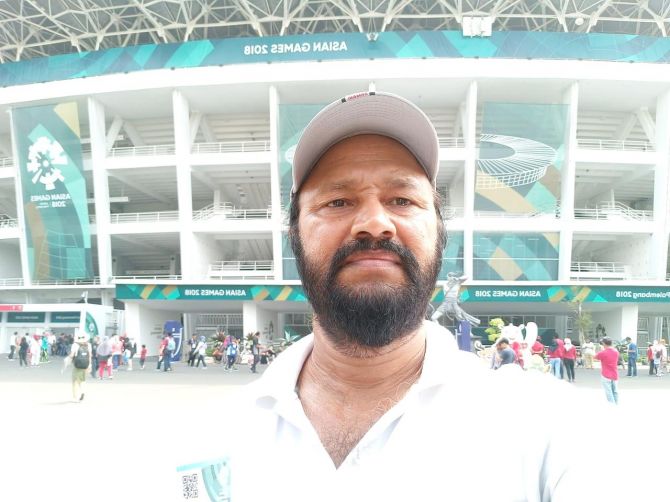
Swapna, Sarkar says, is an extraordinarily strong person or she would never have been able to perform with all those injuries.
"She has worked extremely hard to be where she is, let there be no doubt about it. She deserves the adulation," he emphasises.
"But right now, I just want her to rest. I don't want her to be swept away by her newfound stardom. Jototuko hoyechhe etao bye bye hoyejabe (She will have to bid goodbye to whatever she has achieved if she is not disciplined)," he says firmly.
What if she decides to go with another coach?
"I will never hold anyone back. She has been with me for many years. If she feels she wants another coach, it is her choice. (Laughs.) But she knows if she leaves me she will be the loser."
Before the Asian Games gold, existential questions plagued Sarkar. Sometimes, he says, you look back at your life and think what have I achieved?
"And then, bang, this happens. I am a sportsman basically, so I cannot work in a traditional office, I will die if I am not a coach. But to be a successful coach is another ball game altogether. I love what I do. I love the creativity, the joy of teaching kids, mentoring them," he says.
Swapna will begin training in earnest in November. Next year, apart from the Asian Championship in Doha there is no major sporting event and so the main focus remains the 2020 Olympics and the 2022 Asian Games.
"If she wins gold at the Asian Games, it will be another record," he says.
"A podium win will be unnecessarily optimistic. I don't like bluffing. Headlines like 'Olympic medallist of the future ei shob gaal golpo kora (all this is make believe). I don't like it."
"She needs to get 6,700 points for an Olympic medal. She can do 6,400. If she could run better, she would have gone far," Sarkar says.
Next month, for Durga Puja, Swapna will go home for a few days to Jalpaiguri, her first visit in over a year.
Her tin-roofed home (an upgrade from thatch) has been a pilgrimage for locals and the media since the gold medal.
Her father, back on his feet after a debilitating stroke, drives a cycle-cart used to ferry passengers in rural Bengal and her mother works in a tea plantation. She has three siblings and it has been an uphill battle to feed and clothe the family.
Her mother's name is Basana. In Bengali it means 'desire', a desire for better circumstances, a desire for a life free from want, maybe.
Swapna is the realisation of that moniker.








